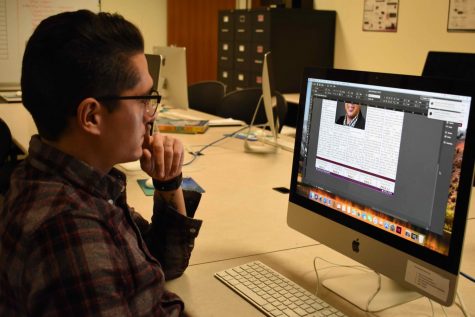Challenges faced in journalism
February 22, 2019

Today’s general public may be unaware of the challenges of journalism and the fact that professional journalists abide by a code of ethics that ensures a free exchange of accurate and fair information.
“Most of the journalists I know care a great deal about accuracy and credibility and getting the story right,” said Laurie Ezzell Brown, editor and publisher of the Canadian Record.
Trust in news media organizations has decreased due to past mistakes and being associated with other falsely informing media. Sometimes a journalist will ask for a quote and the source will not cooperate or accidentally, or even intentionally, give the journalist false information. Combining this with tight deadlines, and the quick spread of information on social media, journalists can unwittingly publish an inaccurate story.
“It’s hard to build a reputation when there’s social media and anybody can put anything they want on social media. So you never know what to believe,” said Joni Yara, editor for the Booker News.
Information spreads quickly on social media and it’s hard to keep up with the demand. This leads to journalists and reporters publishing small snippets of what little information they have and potentially getting it wrong.
“[Social media] gives you instant access to everything and so for us weekly newspapers sometimes it is a full week after the fact before we can publish it when social media publishes it right away,” said Yara. “You know people are past the story a week later and so it’s kind of hard for us to fight that.”
There also lies the issue of anyone can write about their opinion or something happening, these people being bloggers and “citizen journalists”. While having the freedom to express opinions openly is something the public has a right to, it can be an issue.
“I think our job as journalists is just to distinguish between what is opinion and what is news and our job is also to make sure that we get accurate information and report it,” said Brown.
Attempting to publish articles and stories within a timely manner so that the story is still relevant to the present news can be difficult. It takes time to gather information and sources that want to cooperate and who the journalist knows is honest. In order to have the reliable news people want, “instant news” is something the public simply have to realize is not going to happen.
“We’re not going to beat [social media and larger news outlets] to [the story] usually but were going to get this story right,” said Brown. “We’re going to take the time and get the facts right because that’s important to us and we can do things that they can’t do: we can we can find the heart of the story, we can give the story perspective that you know others can’t, we can give it a voice.”
Newspapers that have only distributed their stories through print are being forced to transition to online as a result of a decrease in services offered by printing companies. Such changes can be difficult to adapt to, especially those who have never used these programs before and don’t know where to start.
“I think that’s just kind of where things are going…I think that that’s probably our end goal right now is just to be strictly online,” said Yara. “Even with all the newspapers that still have print copy right now it’s becoming more and more difficult to find somebody to print a newspaper.”
Student journalists also face similar challenges. These students typically balance a course load with with many journalistic responsibilities in attempts to learn how this industry works. This true for those who are graduating within the next 10 years and might not get the job their degree in intended for.
The Bureau of Labor and Statistics states that the “overall employment of reporters, correspondents, and broadcast news analysts is projected to decline 9 percent from 2016 to 2026. Declining advertising revenue in radio, newspapers, and television will have a negative impact on employment growth for these occupations.” This is an estimated loss of 45,000 jobs within the media communication industry in 10 years.
Yes, the journalism industry is changing and newsrooms are shrinking, but journalism provides a set of unique skills which can create various opportunities. With that, there is still a sense of optimism as some small communities trust their local newspapers because the reporters of that town often share the same values.
“But you know part of being in the news business is is getting to know people and learning about the history of a community at least in my world…,” said Brown. “It’s a great business because if you’re not afraid to ask questions and you are curious and interested in people you never run out of information or stories.”



